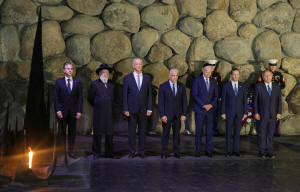U.S., Israeli leaders jointly pledge to deny Iran nuclear weaponry
 Send a link to a friend
Send a link to a friend
 [July 14, 2022]
By Steve Holland [July 14, 2022]
By Steve Holland
JERUSALEM (Reuters) - U.S. President Joe
Biden and Israeli Prime Minister Yair Lapid pledged on Thursday to deny
Iran nuclear weapons, a show of unity by allies long divided over
diplomacy with Tehran.
The undertaking, part of a "Jerusalem Declaration" crowning Biden's
first visit to Israel as president, followed his telling a local TV
station that he was open to "last resort" use of force against Iran - an
apparent move toward accommodating Israel's calls for a "credible
military threat" by world powers.
Washington and Israel have separately made veiled statements about
possible preemptive war with Iran - which denies seeking nuclear arms -
for years. Whether they have the capabilities or will to deliver on this
has been subject to debate, however.
Thursday's statement, released to the media ahead of a formal signing
ceremony, reaffirmed U.S. support for Israel's regional military edge
and ability "to defend itself by itself".
"The United States stresses that integral to this pledge is the
commitment never to allow Iran to acquire a nuclear weapon, and that it
is prepared to use all elements of its national power to ensure that
outcome," the statement added.
There was no immediate comment from Tehran.

In 2015, it signed an international deal capping Iranian nuclear
projects with bomb-making potential. In 2018, then-U.S. President Donald
Trump quit the pact, deeming it insufficient, a withdrawal welcomed by
Israel.
Iran has since ramped up some nuclear activities, putting a ticking
clock on world powers' bid to return to a deal in Vienna talks. Israel
now says it would support a new deal with tougher provisions. Iran has
balked at submitting to further curbs.
"The only thing worse than the Iran which exists now is an Iran with
nuclear weapons and if we can return to the deal, we can hold them
tight," Biden told Israeli TV on Wednesday.
EYES ON SAUDI ARABIA
Beyond enhancing the allies' sense of deterrence and mutual commitment,
the statement's power-projection may also offer Biden a boost when he
continues on to Saudi Arabia on Friday. Riyadh has its own Iran worries,
and Biden hopes to parlay that into an Saudi-Israeli rapprochement under
U.S. auspices.
[to top of second column]
|

U.S. Secretary of State Antony Blinken, Israeli Defence Minister
Benny Gantz, Israeli Prime Minister Yair Lapid , U.S. President Joe
Biden, Israel's President Isaac Herzog, and Yad Vashem Chairman Dani
Dayan stand at the Yad Vashem Holocaust Remembrance Center in
Jerusalem, July 13, 2022. REUTERS/Evelyn Hockstein

Earlier on Thursday, Biden told reporters he and
Lapid had discussed "how important it was, from my perspective, for
Israel to be totally integrated into the region". Lapid, in turn,
deemed Biden's Saudi trip "extremely important to Israel".
Some Israeli as well as Gulf Arab officials believe the nuclear
deal's sanctions relief would provide Iran with far more money to
support proxy forces in Lebanon, Syria, Yemen and Iraq. They are
also skeptical about whether the Biden administration will do much
to counter Iran's regional activities.
A U.S. official, asked if Thursday's declaration was about buying
some time with Israel as Washington pursues negotiations with Iran,
said: "If Iran wants to sign the deal that has been negotiated in
Vienna, we have made very clear we're prepared to do that. And, at
the same time, if they're not, we will continue to increase our
sanctions pressure, we will continue to increase Iran's diplomatic
isolation."
A senior Israeli official described the threat of military action as
a means of avoiding war.
"(It) is a guarantee that the diplomatic, economic and legal efforts
against Iran will be effective," Defence Ministry director-general
Amir Eshel told Israel's Kan radio. "Iran has shown everyone that
when it is pressed hard it knows how to stop and change its ways."
The Jerusalem Declaration further committed the United States and
Israel to cooperating on defence projects such a laser interceptors,
as well as on civilian technologies.

The United States was open to future defence grants to Israel, the
statement said, reaffirming Washington's interest in reviving talks
on an Israeli-Palestinian two-state solution.
(Writing by Dan Williams; Additional reporting by Jarrett Renshaw
and Arshad Mohammed; Editing by Howard Goller, Nick Macfie, William
Maclean)
[© 2022 Thomson Reuters. All rights
reserved.]
This material may not be published,
broadcast, rewritten or redistributed.
Thompson Reuters is solely responsible for this content. |